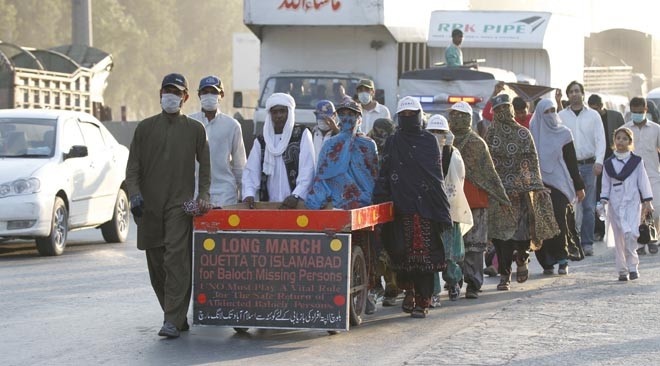
Despite a decade long insurgency and negligible opportunities for participation in public sphere, the Baloch women seem to be making inroads into the space that has so far been exclusively reserved for men

If one is to commit the blasphemy of dismissing the vacuous references to the ‘Balochistan’s peculiar traditions, every now and then flaunted by the powers that be, it is already one of the worst places on earth for women.
A decade long insurgency and a growing dependency of its women on the male members of their families to negotiate with modernity, coupled with negligible opportunities for participation in public sphere, have come together to exact enormous miseries on women of Balochistan. More so in the rural areas of Baloch inhabited districts of the province, where Pakistan’s military and Baloch separatists have their horns locked for quite some time now.
It is not to deny that spare a few, the majority of ordinary people in the province are forced to lead a life under repression. However, it is the women of Balochistan who have suffered the most. Too many of them have lost sons and husbands to a bloody war that has been underway for the last one decade, grief stricken yet condemned to carry on and fend for themselves and their families.
The missing persons saga continues to contribute to their miseries, as well. For example, in the households where men have gone missing, the women have been forced to take charge. For them the drudgery of routine has coincided with the agony of a missing family member -- often the bread winner of the household. Nevertheless, they have shown tremendous resilience, both publicly and privately.
From marching long distances for the recovery of their loved ones to organising protest rallies and sit-in camps; the women seem to be making inroads into the space that has so far been exclusively reserved for men. Obviously, this new trend has more to do with compulsion rather than choice. As a matter of fact, Zar Jan, the wife of Zahid Kurd, has been running from pillar to post for the past two months to learn the fate of her missing husband. While the likes of Farzana Majeed continue to shuttle between courts and press clubs without any respite.
A chain of recent events indicates that the women in Balochistan better brace themselves for even worse. It is unfortunate that it takes as horrifying events as of last month -- when unknown men threw acid on the faces of six women shoppers in the bazars of Quetta and Mastung -- to remind us of the hardships of women in Balochistan. As a matter of fact, stakes in Balochistan are so high that it looks crass to point out the plight of individuals amid competing grand narratives of national rights and national interest. It is thus high politics that has come to define and dominate the lives of people of Balochistan.
Regardless of the twisted rationale that prompted these horrendous attacks, one is dumbfounded by the callousness meted to the women here on a daily basis. They have to face a retrogressive social order at one level and bear with a state that has chosen to stay stern and stoic to their miseries. Despite claims of the incumbent provincial government that things have improved, there is overwhelming evidence that nothing substantial has changed.
The forced closure of co-ed schools in Makkuran region and the recent attacks on women in the northern parts of Balochistan, appear to be two manifestations of the single grand design to repress its already beleaguered women. The people of Balochistan have seen more than their fair share of brutality -- particularly the women, but sadly their woes fail to attract much concern.
Serious violations as the recent acid attacks, at maximum manage to engender dull references to ‘Balochistan’s peculiar traditions’ and fangless condemnations. Ironically, the riwayat mantra is most frequently invoked by the quarters that claim to practice pro-people politics, i.e nationalists. The riwayat-response is not merely superficial, it is problematic for other reasons as well: for one, it portrays an image of people living in Balochistan as trapped in a time warp, unchanging, and following esoteric codes to conduct their lives; as if prior to the attack, everything was nice and good and in accordance with those rules. By extension it means that the normal course of conduct, in this case the treatment of women, is perfectly fine. Furthermore, the riwayat-line effectively discourages rational inquiry into the existing social arrangement. As a result it unwittingly or wittingly upholds the status quo.
Such attacks, more than anything else, should provide us with the opportunity to do some soul searching: as any serious attempt to rectify the situation, would require intellectual conceptions that go beyond traditional and simplistic recourses. And it’s only then that the roots of deep sexism that afflicts Baloch society today can be unearthed. But again, that’s not going to happen when there is a war going on.